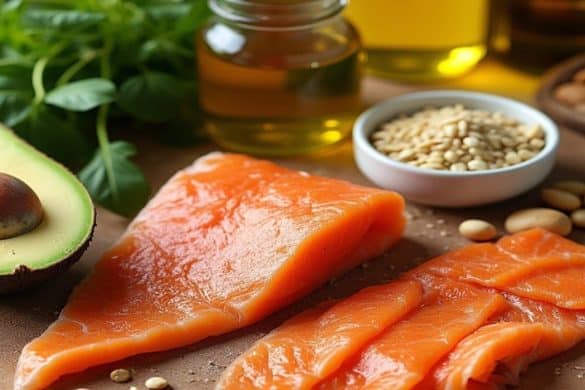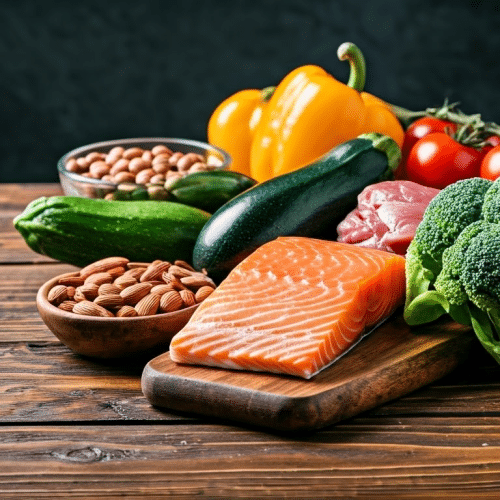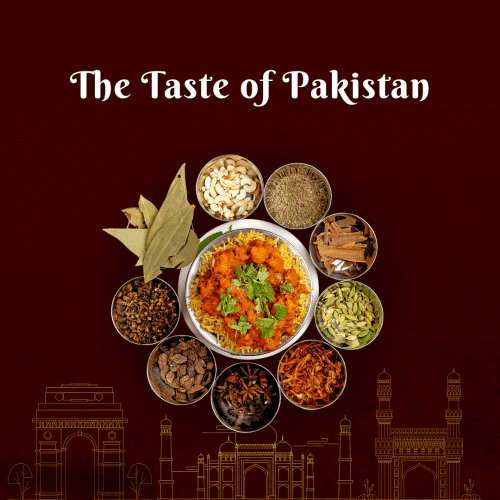In the fast-paced world of modern living, where fashion and wealth often take center stage, we sometimes forget that a person is not just defined by appearances or material success but by spirit, soul, and body. While we are called to honor our bodies as temples, we cannot disregard the importance of good nutrition. In the past, food was primarily seen as a necessity – a means to nourish and sustain. Yet today, it has often become a trend, with many indulging in whatever they desire, regardless of time or quantity. In fact, telling someone that the body is a temple might seem almost laughable in today’s culture, where the convenience of fast food and the ease of food delivery have become ingrained in daily life.
This article is for those who are seeking to make a positive change in their approach to nutrition. It serves as a comprehensive guide to healthier eating and empowers us to embrace a more mindful and nourishing relationship with food.

The ultimate guide of healthy eating
Image source: https://unsplash.com/photos/a-close-up-of-a-piece-of-bread-on-a-plate-aF_2yC-DSJE
The benefits of making informed food decisions
Regarding food shopping, your decisions should not be left to chance, nor should you be swayed by the most attractively designed labels. To improve your relationship with food, you must know how to read labels by studying the ingredients list and watching out for the serving size. Look for nutrient-dense foods that contain a high value of vitamins, minerals and fibers, and keep in mind the number of different names used for sugar on nutrition labels is over 60. A prudent approach is to select foods labeled “no added sugar” or those containing no more than 5 grams of sugar per serving. Foods labeled “healthy” have limits for total and saturated fat, sodium, and cholesterol. According to the FDA, foods labeled as natural may imply that they contain no artificial ingredients, but you can verify the actual contents for complete transparency.
Foods to embrace if seeking a healthy lifestyle: Fruits(an apple a day keeps the doctor away), eggs, unprocessed meats, nuts, seeds, vegetables, fish, and dark chocolate.
Foods to avoid if you’re afraid of empty calories: Packaged donuts, processed meats, chips, fries, pizza, pre-made dough, energy drinks, regular soda, flavored yogurts with added sugar, non-dairy coffee creamer, and fruits canned in syrup.
Core aspects of a balanced diet
Just as there are 7 continents, the key components of a balanced diet can also be broken down into 7 essential elements:
Carbohydrates: Despite their bad reputation, they are the primary source of energy for our bodies and should account for about half of our daily calorie intake. The primary food group rich in carbohydrates is grains, which can be found in bread, pasta, rice, crackers, and breakfast cereals and reduce the risk of artery disease and stroke. Sugars, once entering the body’s cells with the help of insulin, give you energy to perform lots of activities such as running and thinking. However, excessive sugar intake can have detrimental effects, such as weight gain and lethargy.
Proteins: If discussing amounts, protein should be a quarter of our diets. They have a key role in repairing and strengthening muscle tissue, keeping the immune system strong, and maintaining pH and fluid balance. You should always have meat, fish, chicken, eggs, and beans in your thoughtfully designed kitchen, as they are a good source of protein. Vegetarians can try nuts, seeds, quinoa, tofu, Greek yogurt, and cottage cheese.
Fats: A modest proportion of an average person’s daily diet should come from food fats, as it lowers the risks of developing heart disease, improves blood cholesterol levels, and reduces inflammation. Carefully, overstepping limits does the opposite, so you should focus on incorporating good fats in your diet (olive oil, avocado, seeds, fish, beans) rather than unhealthy ones (sweets, food containing hydrogenated oil, and fried meals).
Vitamins and Minerals: Supplements may be the latest trend, but why not focus on getting essential minerals from the right foods for our bodies? If you lack vitamin C, try oranges. If you need vitamin D, eat ½-ounces of salmon. For vitamins E and K, incorporate raw broccoli into your diet (even though it is nobody’s favourite).
Water: “Stay hydrated” is no longer a caption for our Instagram gym stories, as dehydration comes with headaches, tiredness, and dizziness. Women’s daily recommended water intake should be around 2.7 liters and 3.7 liters for men. This quantity can vary depending on age, activity level, climate, and overall health.
Fibers: They are the digestive system’s best ally, ensuring regularity and supporting the health of our bowels and intestines. There are soluble fibers that dissolve in water and keep the blood sugar regulated (oats, bananas, sweet potato, apples, strawberries) and insoluble ones that add bulk to the stool (whole grains, almonds, potatoes, popcorn, and beans)
Antioxidants: Dark chocolate, pecans, blueberries, kale, red cabbage, and spinach are foods rich in antioxidants. Green tea, pomegranate, and acai juice are drinks rich in antioxidants.
Links between nutrition and mental well-being
Depressive episodes are strongly related to the type of food we consume, the time we allocate between meals, and the quality of aliments. Adhering to a healthy diet that contains 7 components listed above can significantly reduce inflammation and alter neurotransmitters, reducing the symptoms of depression. The phrase “we are what we eat” holds undeniable truth, as our food choices directly impact health and vitality. While we all love coffee for the energy boost it provides, it can sometimes be followed by an unsettling wave of anxiety. The same for alcohol and excessive sugar, which may offer a temporary high but often leave behind negative aftereffects. There is an irrefutable connection between our diet and our mental well-being, as the food consumed can directly influence our mood, as fiber-rich foods like fruits, vegetables, and whole grains ensure a stable gut-brain connection, making serotonin dance through our system.
We should always eat with a sense of consciousness, savoring each bite and acknowledging how it nourishes our bodies and minds.
The art of being present at every meal
You may recognize this scenario: you’re engrossed in your favorite TV show, and before you realize it, 30 minutes have passed, you’ve devoured an entire plate of food, and you’re still craving more. While everybody does it from time to time, making it a regular habit can have adverse effects on both your physical and mental health. You might not realize it, but unconscious eating can stem from various triggers such as stress, loneliness, heartbreak, and anger. Many people turn to food for comfort or escape, using it as a copy mechanism to numb difficult emotions or fill a void that can’t indeed be satisfied by food alone.
Mindful eating begins by cultivating a sense of presence. Being sucked into a riveting plot from your favorite Netflix series will prevent you from truly being mindful of what and how you eat, taking away your chance to acknowledge what your body signals are telling you. This generally leads to insufficient satisfaction from typical portion sizes, encouraging overeating, which can ultimately lead to fat gain.
Start by turning off or putting away digital distractions, inhale the aroma of the food, show gratitude, and then savor. Slowly eating is always beneficial as it allows you to appreciate every bite, improve digestion, and enhance your awareness of hunger cues. It takes approximately 20 minutes for your brain to signal that you’re satisfied, so allow this time for your body to properly communicate its needs. Transforming your overeating habits into a mindful relationship might feel a bit silly at first, but it ultimately leads to a more balanced and satisfying diet. Eventually, you’ll learn to stop when you’re satisfied, not when you’re overly full and plunged into a state of oppressive lethargy.
Bad eating habits you should avoid
Eating close to bedtime: Not only does late-night eating contribute to weight gain, but it can also affect the quality of your sleep for several reasons. When you overeat, your body is forced to exert more significant effort in processing the large meal, diverting energy toward digestion rather than relaxation. This can ultimately lead to discomfort, indigestion, or acid reflux. Large meals, especially those rich in fats or sugars, can lead to blood sugar fluctuations, disrupting the body’s ability to fall asleep and maintain a restful slumber.
Skipping meals: Considering the popularity gained by intermittent fasting in the last years, we must address the consequences implied. Going too long without eating can seriously damage your mental health, as routine controls have found that almost 400,000 individuals associate bypassing breakfast with a serious risk of depression and anxiety. Moreover, skipping meals can severely lower your energy and affect your brain’s capacity to efficiently handle tasks, making you struggle for hours for things you would typically straighten out really quickly.
Internet diets: You cannot rely on the quality and accuracy of online nutrition-related information, as you might encounter a large amount of erroneous information that later on can affect your health and well-being. Micronutrient deficiencies are among the side effects of several diets available online, sometimes leading to awful consequences such as hair loss, nail weakness, and dizziness. At the same time, your body might be overtaken by a wage of nausea and the unsettling urge to vomit, as well as diarrhea and constipation. If you’re considering starting a diet, you should consult a registered dietitian or a nutritionist, as they know how to approach this matter thoughtfully, prioritizing nourishment and long-term wellness over quick fixes.
Final Thoughts
Adopting a healthy eating regimen can present an overwhelming amount of information to process, so it’s essential to approach it with patience, studying each component thoughtfully. By gradually embracing a healthier style, you may ultimately spare yourself from a future spared with endless doctor’s visits, enjoying a lifestyle of greater vitality and well-being.













